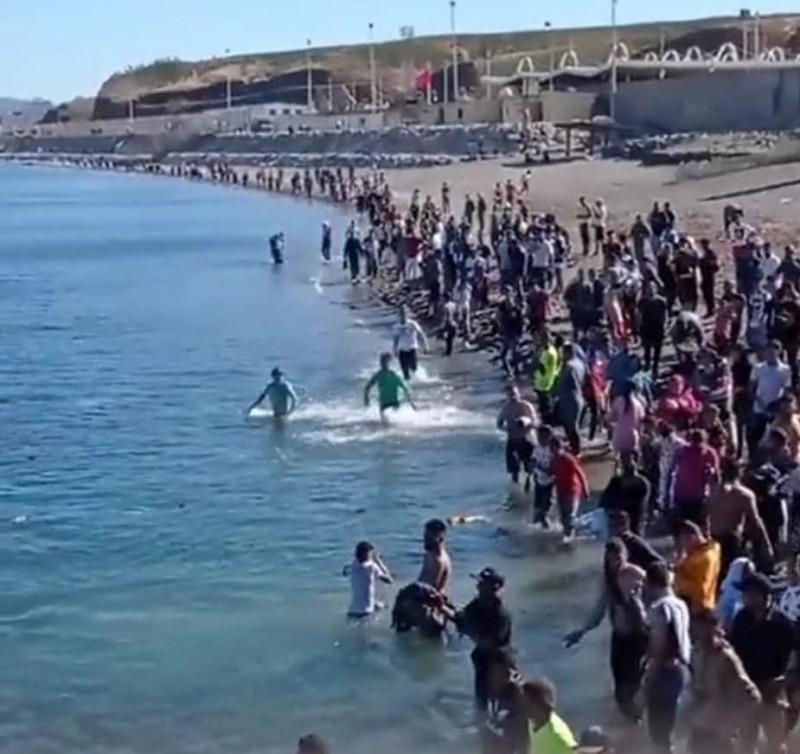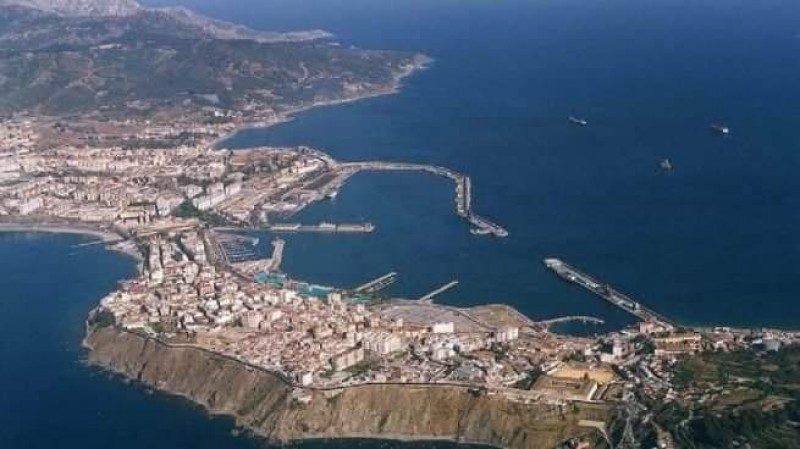ARCHIVED - Spain deploys military troops after 6,000 migrants storm Ceuta borders
Several military units were mobilised this morning, Tuesday, May 18, to control the city's streets after thousands of irregular migrants from Morocco stormed the borders.

Spanish troops have been deployed to help control Cueta's streets after almost 6,000 irregular migrants from neighbouring Morocco broke the region's borders and entered Spanish territory.
Spain's President, Pedro Sánchez, has assured the government will restore order "as quickly as possible" on the borders of Ceuta and Melilla, and said in a statement: "We will be firm in any circumstance."
The exclave of Ceuta is one of two autonomous Spanish territories lying on the African coast and shares a 6.4km long border with Morocco, from which it is physically confined by a border fence, which also juts out into the sea. It is separated from mainland Spain by the Strait of Gibraltar, a distance of 17km from the province of Cádiz in the Andalucía region.
The Moroccan government has repeatedly called for the territory to be transferred to Moroccan sovereignty, but the Spanish government maintains that Ceuta has been a Spanish territory since the 16th century.
Irregular migrants attempting to enter Spain via the Ceuta border has been a contentious issue for many years and there are frequent attempts to scale the border fence, which is continuously reinforced, or swim around the border fence where it meets the sea.
Under European migration laws, the Spanish government can only repatriate migrants if it can prove their country of origin, a task which is made as difficualt as possible by the migrants who wish to enter Europe, with Spain as a gateway, and normally carry no ID, making repatriation very difficult for the Spanish authorities.
In unprecedented scenes in Spain, thousands of migrants, including around 1,500 children, have reached and broken through Cueta's borders in the last 24 hours, either swimming or walking across at low tide.
Shocking footage shows the irregular migrants storming through the Tarajal entry point, advancing towards the centre overnight.
And in other images shared on social media, thousands of people can be seen running through the city fleeing from the police.
At least 2,700 migrants have reached Spain's Ceuta enclave from neighbouring Morocco. Spanish media says Moroccan border guards did nothing to stop them.
— Active-Patriot (@PatriotActive66) May 17, 2021
Spain's Ceuta & Melilla enclaves have become magnets for North African migrantshttps://t.co/brrV3izmFP pic.twitter.com/rtAhAjVZgg
Several Army units were deployed early this morning to the beach to assist Ceuta's normal 1,100-strong border force at the main entry point, Tarajal, on the enclave's south side.
And a further 200 Spanish military troops have also been patrolling the streets of the autonomous city trying to control the sudden influx of people from Morocco,
Spain's Ministry of the Interior is negotiating the return of the migrants with Morocco, and so far about 2,700 returns have reportedly been carried out.
And the ministry has also sent 200 police officers to Ceuta to speed up the return procedure.
He hablado con diferentes actores políticos, tanto españoles como europeos, para abordar la situación de manera coordinada. La prioridad es garantizar el control del tránsito en la frontera con Marruecos y dotar a Ceuta y Melilla de los medios necesarios para solventar la crisis. pic.twitter.com/NDwFO061Nj
— Pedro Sánchez (@sanchezcastejon) May 18, 2021
"They will be forceful in defending the borders and will adopt all the necessary measures to reverse the extraordinary and exceptional situation," said Minister for the Interior Fernando Grande-Marlaska in sentiments echoed by Spain's President.
Cueta's own President, Juan Jesús Vivas, 68, said this morning he had never seen anything like the scenes witnessed overnight and this morning.
“I have been president for 20 years, 40 years as a public servant," he said, adding: "I am from Ceuta and there are few days as hard and difficult as this one, not so much because of the episode itself but because of what it transcends and what the episode can do to the spirit, heart and morale of the people of Ceuta. That is what worries me most at the moment.”
He hablado con Juan Jesús Vivas para trasladarle el apoyo de Andalucía a Ceuta. Compartimos la inquietud de un pueblo hermano. El Gobierno de España tiene que habilitar los recursos necesarios para resolver la situación. Es un asunto de Estado. Unidad.https://t.co/fNmQPk4I4P
— Juanma Moreno (@JuanMa_Moreno) May 18, 2021
Other Regional leaders from across Spain, including President of Andalucia, Juanma Moreno, have apparently spoken to Juan Jesús Vivas "to convey the regional government's support for Ceuta".
"We share the concern of a brotherly people. The Spanish Government has to provide the necessary resources to resolve the situation. It is a matter of State unity," tweeted Moreno.
While negotiations are underway to return the irregular migrants, the Ceuta Bar Association claims its lawyers have not been notified, normally the case when there are numerous entries.
As such there are reports the returns are being made "without the slightest formality".
However, the Minister of the Interior assured that "in accordance with the law and international treaties, we will protect minors" who are not subject to legal return agreements.
In May, more than 100 migrants arrived at Ceuta's Tarajal entry point, and all but around 30 minors whose ages were confirmed by medical tests, were sent back.
Relations between Morocco and Spain are strained at the moment.

Morocco is furious that the leader of the Polisario Front, Brahim Ghali - who has been fighting for the independence of Western Sahara for decades - is receiving medical care at a Spanish hospital and have accused Spain of admitting him under a false name.
However, the Spanish government said today it was an unconnected issue.
Even at the height of migratory pressure in Spain, illegal entries on this scale have not been seen before.
The most recent record was broken on the weekend of November 7 and 8 in the Canary Islands, when 1,500 people entered in a single day. Over the course of the two days, almost 2,200 reached the shores.





























